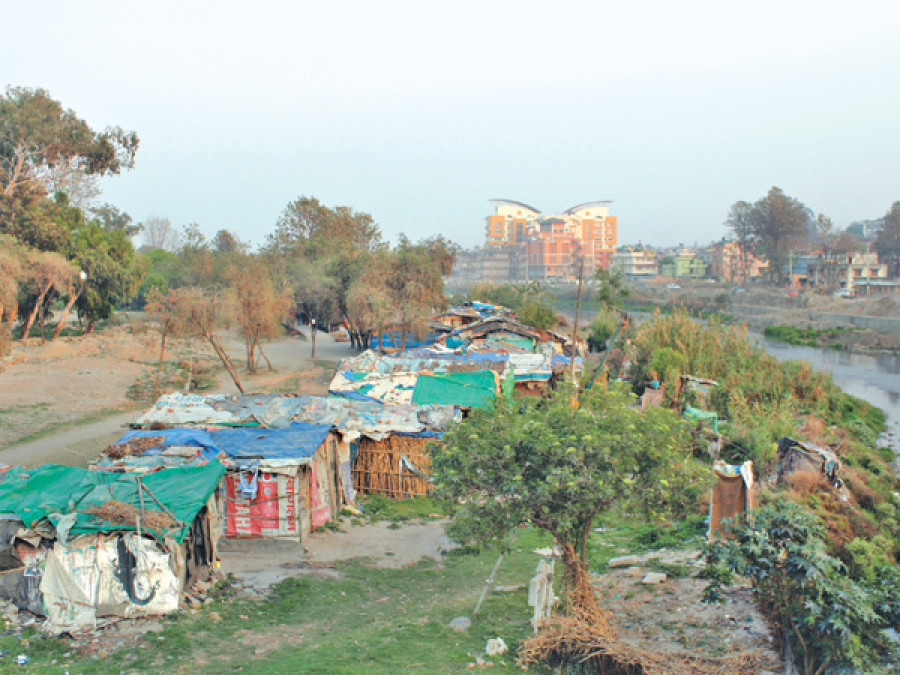National
‘Festivals are now only for rich’. Working class bears brunt of pandemic
Covid-19, lockdowns force squatters to give up their zeal to observe festivities.
Anup Ojha
For Parbati Chhetri, Teej used to be one of her favourite festivals. But this year, she doesn’t feel like celebrating it.
Chhetri, 39, lives with her family of five, one of the 200 squatter households in Sinamangal and its surrounding areas in Kathmandu.
“In the past, we used to go to the Pashupatinath temple in the morning of Teej, and during the day, we’d dance in our locality. But now none of us can come out of our houses due to the Covid-19 restrictions,” said Chhetri, who was recently forced to quit her housemaid job she held onto for three years.
This year’s Teej was different for many in Kathmandu, as movement of people and gatherings were restricted due to prohibitory orders issued to contain the spread of coronavirus. Women and girls who would have donned red sarees and danced to the tunes of Teej songs couldn’t do so this time.
Ram Krishna Shrestha, chairperson of Ward No.9, said his office didn’t allow anyone to come out of their houses. “The squatters are most vulnerable to the disease, as crowds can gather there easily,” said Shrestha. He said that till date, Covid-19 hasn’t been reported in the cases of settlement.
However, for women from middle and upper middle class, the government’s prohibitory rules only changed the way the festival was celebrated. The sound of blaring loudspeakers could be heard in many neighbourhoods, although alleys across the Valley remained eerily empty.
Many women were seen celebrating the festival connecting with their loved ones on apps such as Facebook, Whatsapp, and Zoom, among others. “ I could not meet my sisters and relatives personally,” said Laxmi Paudel, 43, from Banasthali. “We gathered on Facebook messenger, sang and danced together.” The banker said her family didn’t have a problem with food as she went shopping on Wednesday, the day before the restrictions came into effect.
But for Chhetri, celebrating the festival “virtually” is not an option. The mother of three, who lost her job following the nationwide lockdown that started on March 24, spent the day worrying about feeding her children, and staying safe from the pandemic while living in a congested settlement.
The total number of Covid-19 cases in Kathmandu Valley currently stands at 2,880—2293 in Kathmandu, 392 in Lalitpur and 195 in Bhaktapur.
The prohibitory order announced by the chief district officer of Kathmandu this Thursday killed whatever zeal the family had for celebrating festivals.
“During the lockdown days, we used up the little money we saved. We even received some food as relief,” said Sukra, 43, Parbati’s husband.
“But this time, the government is not distributing relief and we can’t get back to work,” said Sukra, a construction worker who has been unemployed for over four months. “We had to spend the lockdown in our two rooms with kids aged 9, 11, and 17.”
“How can we have the luxury to celebrate the festival online when we don’t even have internet for our kids’ online classes?,” asked Parbati.
After widespread criticism from various sectors, the government lifted the lockdown on July 21—much to the respite of the Chhetris. Parbati had started to sell roasted corn in Sinamangal Chowk and was making Rs 15,000 a month as Sukra brought her the maize.
According to the Nepal Landless Democratic Union, around 29,000 squatters live in Kathmandu. Nepal Mahila Ekata Samaj, a non-government organisation set up to work with landless and homeless women, estimates the number of women living in such settlements to be around 12,000.
It’s not just about festivals; women living in such settlements are vulnerable to all kinds of shocks, say activists working with them.
“Women and people living in squatter settlements are in the most vulnerable condition at this time,” said Bina Buddhacharya, treasurer at the Samaj. She said most of the women who used to work as hawkers, construction workers, caterers and maids are now jobless.
“Most of them don’t get nutritious food to eat, and the threat of Covid-19 is high in these areas, as families live in single rooms and share toilets with many others,” said Buddhacharya.
Meanwhile, the Chhetris have come to a conclusion that festivities are not for people like them, at least during the Covid-19 pandemic. “I guess we will have more problems during Dashain and Tihar because things will get more expensive,” said Parbati.
“These days, festivals are only for the rich. They have the money to buy anything they want even while they are out of work, as they have enough savings,” said Parbati. “We don’t have that luxury.”




 14.24°C Kathmandu
14.24°C Kathmandu.jpg)















